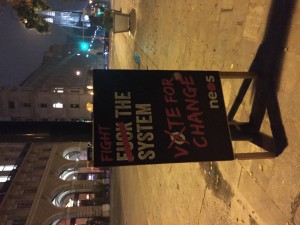If you are a political junkie who also enjoy exploiting the different opportunities globalisation offers, you might understand what I have to say here so very dearly: to be a decent interlocutor (more so if you also want to seem slightly educated), the first thing you ever learn from a conversation is always “the rules of the context at that moment”, the local rules on the playground. Those rules differ on a very broad range of things: from using laymen rhetorics with extended explanations on complicated statements to using Poli Sci terms and inside jokes while throwing in a substantial amount of complicated conditional Nebensätze (subordinate causes, geez such a long term), to what statements are generally agreed upon and not worth mentioning or you should seriously tuned down.
Yes, I know, I know. We should always speak our minds, state our true opinions, blah blah blah. But if you are as same enthusiastic in political discussions as me, you would surely understand: not recognising the underlined “rules of the context at that moment” usually just stirs up emotional antagonism and leads to disastrous experiences where you either get out only irritated or hurt, or gradually get excluded altogether from the conversation— sometimes people just really do not need that “additional perspective” and do not want to hear what you have to say coming from that.
I remember my first two years in Political Science classes at CC was very much about just learning this new context. I have always been so interested in politics that it scared my parents at first. My hometown back in China was this very political place famous for all the rebels and revolutionists throughout the history, the most recent famous one being Mao. I certainly do not suggest that I live up to his legacy (what’s that even supposed to mean lol), but I admit to have looked up to these ancient Landsmänner (countrymen…?) as core-to-heart inspirations during my rebellious youth. I was already so used to throwing certain phrases around, like how “the rightists” are the progressive liberals and “the leftists” stubborn conservatives loyal to the party (not talking about the beer festival parties); how “nationalism” belongs to the morally high ground and “socialism” rather a milder bad name for all the USSR chaos that went down. These interpretations were already out of the most mainstream context of the majority Chinese. My way of talking was already deemed “too westernised”, or “contaminated” even. However, going into the context of the CC politics classes, I was hardly close to being ready. The first things I have to learn there were how “left” and “right” suggests completely different political contents and how they are perceived by my peers in class, and how “nationalism” is responsible for the rise of militarism yet “socialism” deemed a social system supposedly from pure kindness of human brotherhood. At the very beginning, I could hardly get any point across. To join the conversation is to rush into the hundreds of years of western democratic tradition that has already been intuitive to my peers, or to say at least the twenty years of immersion from their everyday lives. As I liked to eagerly advertise, when you think about the word “politics” in English (or German, “Politik”), you trace it back from into the ancient greek, the polis, the city states and their self-governed, democratic political traditions; while the equivalence in Chinese, “政治 Zheng Zhi”, basically describes the up-down dynamic of a centralized way of governing (regieren). Simply uttering this word in different languages evokes different aspects of its perception.
Now three years in, I can finally eloquently convey my points in this specific context. I play along with the rules on the playground. I know which concepts are the common ground for my peers, and what concessive compromises I have to make before my adversative “although/but” to make it acceptable for my peers to follow. My own beliefs are constantly challenged, and also learned to arm themselves better confronting challenges. I thought I was finally ready, finally educated enough in this field to have informative, inspiring political discussions ever after. So I gave it a few test runs, and proved myself so wrong. I found out I learned to play well on one playground, but there are so many different playgrounds, all played by sophisticatedly different rules. And interestingly enough, they are not always the way as you would imagined they should be.
Verzeihen, whoever accidentally stumbled on this blog and miraculously made it this far. 800 words in, I am finally going to talk about something German in this GermanBlog. Today after my poli sci seminar “Accessing the Obama Presidency”(because it is fun to take Obama in Germany and see what the Germans think about American Politics, while being secretly referred to as the Chinese girl with an annoying fake American accent), my professor Herr Professor Doktor B.(never miss any of the titles) came up to me to say this:”I just like attacking you in class because you are such a strong person. I enjoyed your defence.” This was actually kind of sweet and I took it as a compliment. When in class, he was discrediting some of my opinions by alluding my views were tempered with by Chinese propaganda and thus perceiving the western world in a wicked way. That was quite ironic to me since I also get so much comments of being “too westernised” and “tempered with by the Americans” all the time from my own nationals. But the point that got me this “attack” was actually one that would be well accepted in a CC international relations class: I simply suggested that we should not take Putin as the entire Russia and perceive him as an irrational warmonger, and the U.S. has previously been too invested into abroad military missions. Now if this statement was said in a CC class, especially when by an American student, it would be perceived as harmless criticism on US interventionism and a call upon closer understanding of “the other side”, since the underlined contextual atmosphere of CC is just liberal and internationalist. However when I, a Chinese student, was saying this at a German University, it sounded like an unfriendly nose-pointing from the defensive ally of Putin.
CC definitely does not speak for the whole U.S. public sphere. What is or is not acceptable in a CC class also does not prove any more or less legitimacy of the statement. It is just interesting for me to notice how people get silently offended by different things and started to take a defence automatically to whatever you are going to say next. Apparently most of my classmates here take the more U.S. intervention as a more desirable option, and this has become the hidden context behind. If I have navigated this more wisely, I would tune down myself, only try to slip in some of my disagreement when not have irritated this “common sense” already up front —no, no, this is not being dishonest or cunning, as you might understand already as another political junkie. It is merely a more efficient, craftier way to convey your points to others. Guess there is a point of calling this “political”, huh?
Going on and on about these trivial scenarios I encountered in political discussions is not going to help keeping you reading either, thus not an efficient, crafty way of conveying. So anyways, after a couple minutes of extended discussions on rational actor theory in international relations, and finding out that I actually agreed a lot with his view, Herr Professor Doktor B. gave me a final compliment:”I guess China is going to change for better, because it has people with good conscience like you.” To be a nice player on the playground, I decided to appreciate his comment, and not reading too much into it as to take offence for my other fellow Chinese nationals who also have good conscience, just happen to disagree with him and me. (I love this professor really, don’t take me wrong. After all I am the one crashing others’ playgrounds.)
The sharp edges of these rules can be so exhausting to deal with, especially because they change from context to context, from one conversation to another. There is no wonder so many of my friends took a peek into the hot mess of political debates and decided that they have no interests of jumping in. But isn’t this complexity, these constantly shifting nuances that you forever need to relearn, the exciting part of it for us who truly love an informative, inspiring political discussion? So enjoy being challenged while you can, and one day you will know all the rules so well (or learned to learn them very fast), that you can rock all of them 
















